 Hera (Juno) Greek Goddess - Art Picture
Hera (Juno) Greek Goddess - Art PictureHera (Roman equivalent is Juno) is one of the most interesting figures of the ancient Greek Pantheon of Gods. She is daughter of Cronus and Rhea, the only lawful wife of Zeus, Olympian goddess, protector of marriage and especially married women and personification of conjugal faith. Hera embodies the virtues and defects of the married woman.
She is faithful and loyal, affectionate and submissive woman to her lord and husband. On the other hand, she is also dynamic and resourceful, fractious and grumpy, oppressive and jealous, passionate and vindictive wife. The woman who wants her husband "convict" and devise every possible way to keep him close to her. Hera is usually madly jealous at Zeus, passionately hating and revenging him. Her jealousy is an inextinguishable flame of burning guts and mind drilling. Her revenge usually wipes out everything in its path. Hera is battling, struggling desperately for what rightfully belongs to her, for the object of her desire.
The ancient Greeks, having an original and inexhaustible source of humor, gave a more human dimension to their deities. They imagined the marriage of Hera and Zeus, as an area of constant rivalry, controversy and conflict and the king mortals and immortals, Zeus, to be endlessly victimized by a jealous and vengeful wife and resorting to trickery and machinations to avoid the windy bursts of her wrath.
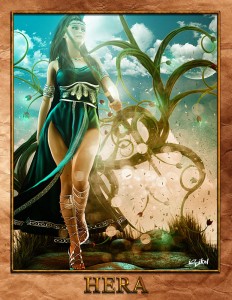 Hera (Juno) Greek Goddess - Art Picture by isikol
Hera (Juno) Greek Goddess - Art Picture by isikolThe birth of the queen of the gods is placed in Samos, while others say in Stymfalia or Euboea. Hera’s fate was no different from that of her brothers. The unforgiving Cronus swallowed her, trying to fight his fate. Only when the resourceful Rea, along with Zeus and Metis, managed to trick and defeat Cronus, then Hera, along with the other siblings, saw again the light.
After the dethronement of Cronus, Zeus requested to marriage her. She fended off proudly. Being madly in love with his sister, Zeus did not waive his purposes. A rainy, winter day, as the goddess was walking in the forest, Zeus transformed into a cuckoo bird and fell at the feet of unsuspected Hera. The goddess pitied the half frozen creature. She stooped, took it in her arms and stroked it tenderly with her arms to warm it. Then the king of the gods took his real form. Magnificent, majestic, powerful and irresistible, overcame all of Hera’s resistance. Hera was defeated, subjugated and became forever his own, having first secured his commitment to marriage.
 Hera (Juno) Greek Goddess - Art Picture by liliaosipova
Hera (Juno) Greek Goddess - Art Picture by liliaosipovaTheir divine wedding was splendor. Their life was not always happy. Instead, it was stormy and turbulent, as their love was also stormy.
The successive explosions of rage and jealousy of the goddess and the frequent quarrels between the divine couple fed the imagination of the ancient Greeks, who created popular stories and readings.
Zeus, arrogant, fickle and unfaithful husband, often crushed her dignity and irreparably hurt her female pride. He did not hesitate even to brag in front of Hera, for his countless adventures with goddesses and mortals.
Hera, untamed, and haughty, invoked her honored lineage and displayed the inalienable rights, her status of lawful wife.
Zeus, through the Homeric verse, stated that he despised her anger and nagging and was insistently asking for her submission. Once, he did not hesitate to transform his threats to acts, tying her hands and feet and hanging her between the sky and the clouds.
 Hera (Juno) Greek Goddess - Art Picture by NeneThomas
Hera (Juno) Greek Goddess - Art Picture by NeneThomasHera often counterattacked, having her dignity dishonored and being blinded by passion for revenge,. Managing to get Athena and Poseidon to her side, she once tried to subdue Zeus, who barely managed to escape thanks to the intervention of Thetis and Hecatonchires Aigaionas. Once again, the goddess decided to abandon forever the "marital bed". Hera returned to Euboea, where for the first time she had given herself to him. Zeus, however, felt the desire for his legal wife rekindled and engineered a ploy to bring her back with him. He went to Euboea, where he spread a rumor that he will marry a beautiful nymph. He even clothed a wooden statue with bridal veils.
Hera, blinded by jealousy, threw herself with hatred to the new rivalry and tore up the veils. In view, however, of the wooden statue, she burst into laughter. This was the laughter of joy and redemption. The love that was smoldering inside her, suddenly transformed into a raging fire. She poured eagerly into the arms of her beloved, defeated and submissive to him again.
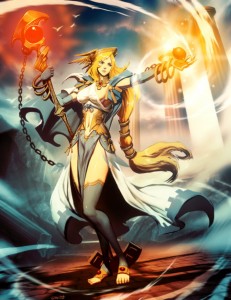 Hera (Juno) Greek Goddess - Art Picture by GenzoMan
Hera (Juno) Greek Goddess - Art Picture by GenzoManBut Zeus was constantly giving her rise. Hera, being furious and unable to personally avenge the unfaithful husband, turned her anger against her unfortunate rivals. Her divine punishment was cruelly and mercilessly falling upon the innocent victims.
Leto, daughter of Titan Koios and Phoebe's, faced the wrath of the goddess. Despite Hera’s efforts, she brought finally to the world, Apollo and Artemis, children of an illegal union with Zeus.
The beautiful Io, daughter of Inachus, king of Argos, was also unable to avoid the wrath of Hera.
Zeus tried to save her by transforming her into a cow. But the jealous Hera tracked her to Egypt, where Zeus gave her original form and gave birth to Epafos. Tragic Semele, daughter of Cadmus, king of Thebes, was another victim of the wrath of the goddess. A horrible death in the flames was waiting for the unfortunate mortal who dared to share her maiden bed with the king of the immortals. The child who had in her womb was saved by Zeus, who sewed it in his thigh, and when the nine months were completed, God Dionysos was born.
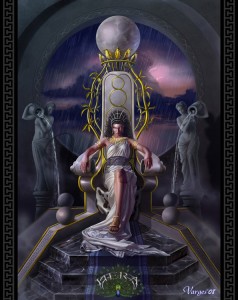 Hera (Juno) Greek Goddess - Art Picture by Varges
Hera (Juno) Greek Goddess - Art Picture by VargesThe passionate frenzy of Hera turned also against the children of her rivals. Heracles (Hercules), son of Zeus and Alcmene, still an infant in his cradle, encountered two snakes that the jealous goddess had sent to kill him. Tragically, by luck, Hera was the one that gave immortality to the illegitimate child of her husband.
At the instigation of Zeus, Hermes placed the infant in the bed of the goddess while she slept. The infant grabbed Hera’s divine breast and drank the milk of immortality. Hera woke up and withdrew in anger the illegal infant. The milk that was cast, at that time, from the life-giving bosom, gave birth to the Galaxy.
Zeus, being the standard of a capricious and unfaithful husband, admits it through the lyrics of Homer that he never loved, nor desired another woman, as the grand Hera. "Never a goddess or a mortal inspired me so much desire."
 Hera (Juno) Greek Goddess with a peacock - Art Picture
Hera (Juno) Greek Goddess with a peacock - Art PictureSince her union with Zeus, Hera gave birth to Hebe, the goddess of youth, and Ares, the bloodthirsty and havoc wreaking god of war. According to others, Ilithyia, mother of aches, and Eris, goddess of discord and non combatant, were children of Hera and Zeus.
Wanting to avenge the capricious Zeus, for his countless illegitimate children, Hera wanted to bring to the world her own children, children who would be born without a carnal union with Zeus.
Hephaestus, according to a myth, was in the womb of the goddess before her union with Zeus. But he was so ugly and laughed at by the gods, that Hera threw him to the sea. That terrible fall left him forever "cripple and splay foot", so he never forgave his loveless mother.
Hephaestus tied her up in a golden throne with invisible shackles and only Zeus managed to free her from this humiliating punishment.
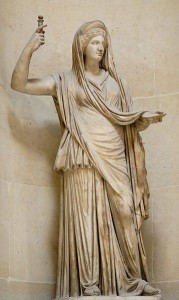 Greek Goddess Hera (Juno) Statue - The Campana Hera, a Roman copy of a Hellenistic original, from the Louvre
Greek Goddess Hera (Juno) Statue - The Campana Hera, a Roman copy of a Hellenistic original, from the LouvreThe terrible Typhon (Hurricane), scourge of mortals, was also a sole son of Hera. Zeus finally managed to kill this hideous beast in a tremendous duel.
Though he was a fickle husband, Zeus could not tolerate anyone to flirt with the beautiful Hera. A cruel and merciless punishment awaited the aspiring lovers of the queen of the gods.
Ixionas, abusing the hospitality which Zeus offered him, tried to reach Hera with erotic mood. The punishment of Zeus was tough. He gave to a Nephele the form of Hera and the drunk Ixionas paired with her. From this union the Centaur was born.
Zeus did not forgive his ingratitude and sentenced Ixionas to be strapped onto a flaming wheel that twirls endlessly in air. Endymion who dared to crave the grand queen, was shattered to Tartarus, while the giant Porfyrionas was exterminated by the arrows of Heracles, while attempting to rape Hera.
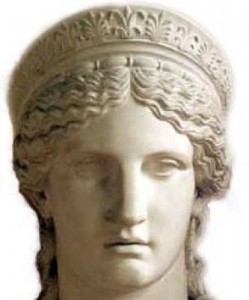 Greek Goddess Hera (Juno) Statue - Hera Ludovisi, 5C BC. Photo by Maicar Forlag.
Greek Goddess Hera (Juno) Statue - Hera Ludovisi, 5C BC. Photo by Maicar Forlag.Although Hera was not known as a war goddess, she stood on the side of the Greeks during the Trojan War. The vengeful and vindictive goddess never forgot the insult of Paris, a frivolous prince who preferred the love instead of the power offered to him by Hera.
Hera was loved, adored and honored by the ancient Greeks. In their souls, this overbearing female presence was completely vindicated.
She had a very special, enviable position among the Olympian gods. It was she who demystified, in the eyes of the Greeks, the power of the man as a master and husband. Hera was the one, that in front of her, the powerful ruler of the universe was losing his strength and felt fear every time he faced her attacks.
In the name of Hera, the wife took her revenge from her husband as part of a well organized male-dominated society.
Please leave a comment if you liked this article 🙂
All pictures are also uploaded in Albums on the Greek Mythology Pantheon page on Facebook, visit us at :


5 COMMENTS
thank you nice illustration
Excellemt article….your descrption of Hera is perfect…personally, I admire this goddess, she was really brave and misunderstood, because she was the Queen of Gods and Marriage! and her marriage was a disater because her testosteronic and promiscuos husband….and she never doubts in confront the “supreme ruler of the Universe”
This is an interesting Article. Happy Day!!!!!
Query to Koukakis : I need U2 expand on my fragment of memory inre: I remember a story were Hera saw a mortal couple , a woman & man (lovers) deeply in love. & in jealous rage sent the Erinyes to crush their happiness. Hera could not abide that any mortal could have the true love that life had denied to Hera herself being denied Jove’s undivided love. Can U provide a citation to authority for my prep school girl’s memory ? Or, can U expand the story 4me ?
NICE WORK! 😊